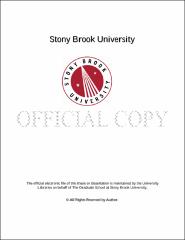| dc.identifier.uri | http://hdl.handle.net/11401/76792 | |
| dc.description.sponsorship | This work is sponsored by the Stony Brook University Graduate School in compliance with the requirements for completion of degree. | en_US |
| dc.format | Monograph | |
| dc.format.medium | Electronic Resource | en_US |
| dc.language.iso | en_US | |
| dc.publisher | The Graduate School, Stony Brook University: Stony Brook, NY. | |
| dc.type | Dissertation | |
| dcterms.abstract | Recent research indicates that experiences of binegativity (stigmatization of bisexuals) have detrimental impacts on components of sexual identity (e.g., sexual identity uncertainty and internalized binegativity) and mental health (e.g., internalizing symptoms, substance abuse). The current study is the first to longitudinally examine the impact of experiences of binegativity on components of sexual identity and mental health. 180 cisgender bisexual women completed three surveys assessing a total of four timepoints. Results indicate that experiences of binegativity predict subsequent increases in internalized binegativity, which in turn, predict increases in sexual identity uncertainty and strength of identification as heterosexual and lesbian and decreases in identification as bisexual. Further, increases in identification as lesbian and heterosexual and decreases in identification as bisexual predicted increases in internalizing symptoms. These findings provide support for a proposed model of the process through which external pressure to conform to the sexual orientation binary leads to the internalization of this pressure and subsequent deidentification as bisexual and identification as lesbian or heterosexual. Given that this process requires bisexual individuals to either conceal or relinquish their bisexual identities, it is likely to result in increases in internalizing symptoms. Results also indicate that buffering and magnifying coping largely did not reduce or amplify the impact of binegativity. However, experiencing more binegativity did predict the use of more maladaptive coping, which mediated the relationship between experiences of binegativity and changes in components of sexual identity. Finally, bi-positive events were found to have a positive impact on components of sexual identity. | |
| dcterms.available | 2017-09-20T16:51:11Z | |
| dcterms.contributor | London, Bonita | en_US |
| dcterms.contributor | Levy, Sheri R | en_US |
| dcterms.contributor | Eaton, Nicholas R | en_US |
| dcterms.contributor | Hatzenbuehler, Mark. | en_US |
| dcterms.creator | Dyar, Christina | |
| dcterms.dateAccepted | 2017-09-20T16:51:11Z | |
| dcterms.dateSubmitted | 2017-09-20T16:51:11Z | |
| dcterms.description | Department of Social/Health Psychology | en_US |
| dcterms.extent | 85 pg. | en_US |
| dcterms.format | Monograph | |
| dcterms.format | Application/PDF | en_US |
| dcterms.identifier | http://hdl.handle.net/11401/76792 | |
| dcterms.issued | 2016-12-01 | |
| dcterms.language | en_US | |
| dcterms.provenance | Made available in DSpace on 2017-09-20T16:51:11Z (GMT). No. of bitstreams: 1
Dyar_grad.sunysb_0771E_13063.pdf: 4259510 bytes, checksum: 347638b8eef59ab1bf6334209b35b0a5 (MD5)
Previous issue date: 1 | en |
| dcterms.publisher | The Graduate School, Stony Brook University: Stony Brook, NY. | |
| dcterms.subject | binegativity, bisexuality, discrimination, mental health, sexual identity | |
| dcterms.subject | Psychology | |
| dcterms.title | Examining the Effects of Binegativity on Components of Sexual Identity and Internalizing Symptomatology among Bisexual Women using a Longitudinal Study Design | |
| dcterms.type | Dissertation | |

